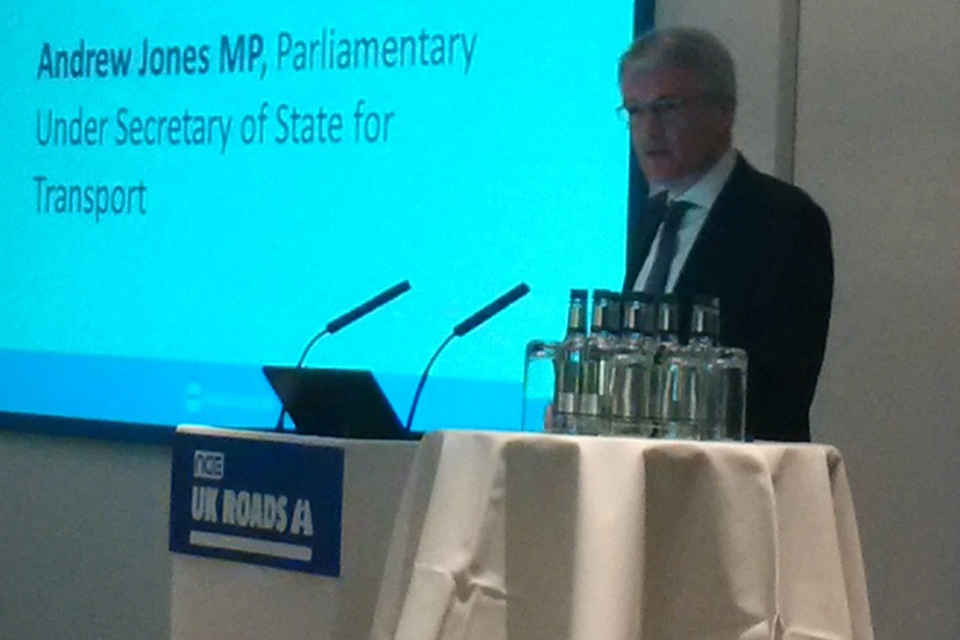Productivity means building more roads
The economic case for road investment.

Thank you for that introduction.
Just before the election, the government published the country’s first Road Investment Strategy.
A £15 billion plan for England’s roads.
A plan which will buy the greatest improvement to our road network since the 1970s.
1,300 miles of new lanes.
New surfaces for 80% of our most important existing roads.
And better roads to our airports and our sea ports.
This morning (9 July 2015) I will affirm the new government’s commitment to the Road Investment Strategy.
But I also want to set the strategy in its economic context.
Because it is the economic context which shows why road investment is more urgent now than ever.

Andrew Jones at New Civil Engineer UK Roads Conference 2015
Economic context
5 years ago, the deficit was more than 10% of GDP; the highest in our peacetime history.
After 5 years of tough decisions, the deficit is now less than half that, but it’s still among the highest in the developed world.
More significantly though, our economy has gone from recession to remarkable recovery.
The Office of National Statistics has said the first quarter of 2015 was the ninth quarter in a row of continuous economic growth.
And that our economic output is now estimated to be over 10% higher than its low in 2009.
For 2015, Britain is expected to have the strongest economic growth of any major advanced economy in the world.
But it is circumstances like these, when we have good economic growth alongside a still-too-high deficit, that the government could have the perfect excuse to cut capital spending on roads and other infrastructure.
After all, road investment costs money we could dearly use to reduce the deficit.
And although the economic gains from road investment are beyond doubt.
Our economy is growing, so some might say more spending on roads isn’t needed.
But that is not the position of this government.
We are determined to restructure our economy for the long-term.
Not pander to the false economies of the short term.
And that is why the Road Investment Strategy – and the work that you will do in seeing that strategy through – is so vital.
Productivity
This morning I want to explain the contribution that road investment will make to one of our country’s greatest economic challenges.
Productivity.
For decades, the productivity of our economy has lagged behind that of our competitors.
In simple terms, for every hour we spend working, we produce less than our competitors do in the same time.
17% less, when you compare us to the rest of the G7.
And 27% less than France.
We only manage to make up some of the difference by working more hours.
Economists argue about the reasons for the productivity gap.
But everyone can agree on one thing.
Much of the blame goes to the state of our national infrastructure.
In the last 25 years, France has built more than 2 and a half thousand miles of motorway – and we’ve built just 300.
Today, the World Economic Forum ranks Britain 27th in the world for infrastructure quality.
That’s 6 places higher than we were in 2010, but it’s still far behind countries such as France: 10th in the same list.
Our roads – the arteries of our economy – are seizing up.
Whenever a lorry-load of components fails to arrive on time because of congestion, whenever a business chooses not to open an office in a new city because they know it will mean staff spending hours a day in slow moving traffic, whenever a client-meeting is postponed because emergency repairs have closed the road, that’s the effect of our poor infrastructure on our productivity.
If we do nothing, by 2040 congestion a quarter of all travel time will be spent sitting motionless in traffic.
A further loss to national productivity equivalent to 100 million working days every year.
Government and industry in partnership
That is why the government is now turning to the roads industry to help solve our productivity challenge.
After announcing the Road Investment Strategy in December, we put the plan into our manifesto.
The country voted for it.
And we will keep our promise.
But we will do more, too.
Vehicle Excise Duty was originally intended to fund our roads, but for many years the receipts have been treated as general taxation.
Yesterday, the Chancellor announced that this will end.
From the end of this decade, every single penny raised in Vehicle Excise Duty in England will go into a new strategic Roads Fund.
The Roads Fund will pay for the sustained investment our strategic roads so badly need.
This is proof the government’s commitment to deliver road investment is no short-lived enthusiasm, but a long-term reversal of national policy.
Now we want to support you to get the work done.
It’s a great opportunity for the road building industry.
If – together – we get it right, the roads sector will make the greatest contribution to national competitiveness, stability and prosperity than it has for generations.
Of course, there are challenges.
But this government won’t load the burden of those challenges solely on the shoulders of the industry.
It has to be a partnership.
We are already changing the historical attitude to road investment held by successive governments.
Because in the past, the problem wasn’t just the lack of investment.
It was the fact that when investment did come, it tended to be unpredictable and inconsistent, often announced in haste, and then quietly dropped in haste.
This stop-start approach to investment has had a damaging effect on the road building industry.
It didn’t make sense to invest in equipment that risked standing idle, or maintain a standing army of road builders.
And so every time there was an outbreak of spending, much of the cost went on short-notice hiring and training.
That’s inefficient for you, it doesn’t get the best value for tax payers, and it’s not an attractive proposition for anyone thinking of joining the industry.
So in the Infrastructure Act 2015, we wrote the road investment strategy into the law, holding this and all future governments to the same long-term roads planning.
It will reduce cost to the tax payer, and it will give certainty to the industry.
Certainty to invest in equipment, staff and training.
Certainty for contractors to strengthen relationships with their suppliers.
Certainty to hire new engineers, surveyors and construction workers.
Apprentices, graduates and project managers.
The industry must capitalise on that new certainty now.
Because we estimate that the road building industry will need to grow by a third, at the same time as skilled people are in demand for all our other great infrastructure projects; Crossrail, HS2, HS3, new power stations, the northern line extension, flood defences.
All these projects have entered the competition for ambitious recruits.
The government’s commitment to create 3 million apprenticeships will help.
But we need the industry to get behind the plan, too.
So when the road consultations have finished and the work goes out to tender, we will ask – do bidders have access to the skills to get the job done?
Do they have the apprenticeship programmes and the training in place?
The answer must be: ‘yes’.
Because this government’s commitment to the Road Investment Strategy could not be stronger.
The economic case is clear.
We are choosing to make this unprecedented investment not despite the condition of our economy, but because of the long-term needs of our economy.
We will work with you and support you.
But now it is down to you – the professionals and experts, the leaders of your companies – to get the work done.
Thank you.